#the western tradition
Photo
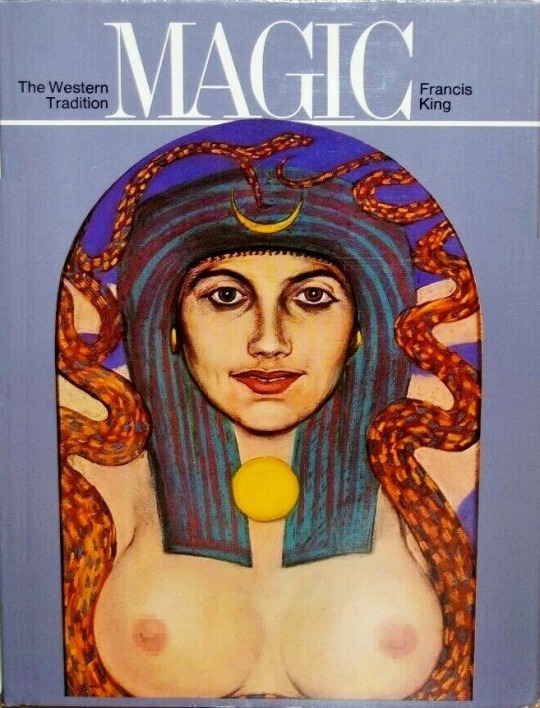
Francis King - Magic: The Western Tradition - Book Club Associates - 1975 (on the jacket: Isis Unveiled, pastel by Austin Spare, 1954)
#witches#magic#occult#vintage#francis king#austin osman spare#the western tradition#book club associates#1975#isis unveiled#austin spare#1954
71 notes
·
View notes
Text
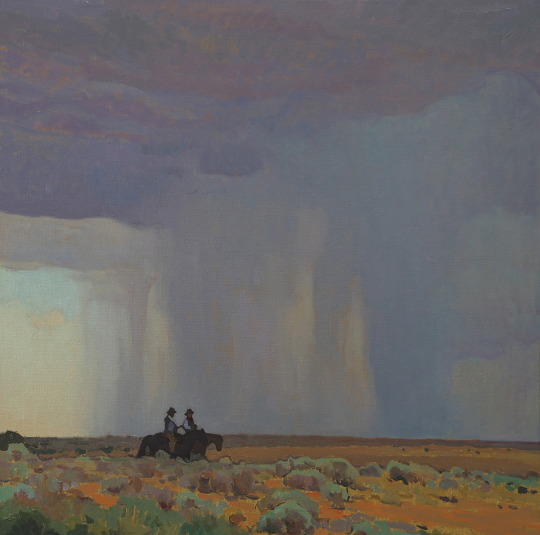
Storm Riders by Glenn Dean (x)
#art#painting#traditional#glenn dean#landscape#western#modern art#20th century art#21st century art#western art#cowboy#cowboys#cowboy art#wild west#wild west art
6K notes
·
View notes
Text

Bwa dancer, Burkina-Faso, by Carol Beckwith and Angela Fisher
#bwa#burkina faso#africa#western africa#folk clothing#traditional clothing#traditional fashion#cultural clothing
4K notes
·
View notes
Text


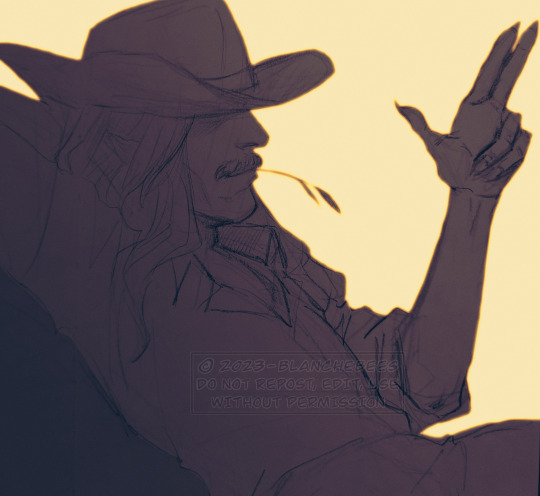
Yeehawgust has commenced and thus i share Cowboy ghoul
Tip jar
#fire ghoul#dewdrop ghoul#sodo ghoul#nameless ghouls#nameless ghoul#unmasked ghouls#the band ghost#ghost bc#ghost fanart#ghost band#ghost the band#ghost bc fanart#cowboy#western#demon#artists on tumblr#illustration#traditional art#fanart#doodle#sketch#ink#my art#I might try and draw some prompts off the list
3K notes
·
View notes
Text

if you cant get an organic s2 wedding, then store bought is just fine!!!!!!!!
#kinnporsche#kpts#kinn x porsche#i know in my heart that if we had gotten a s2 they would have gotten married there....... i just know it. pond dmed me and told me trust me#anyway!!!!!!#originally i was gonna give them boring western suits but u know. thai traditional wedding attire is so pretty#sorry for any inaccuracies. i tried to look at multiple references but whew#i still wanna draw them on western wedding suits tho
533 notes
·
View notes
Text

Domenico Guidi (Italian, 1625-1701)
Angel with the lance, n.d.
Ponte Sant'Angelo, Rome
#domenico guidi#italian art#italy#italian#angel with the lance#ponte sant'angelo#rome#art#fine art#sculpture#western civilization#southern europe#mediterranean#europa#european art#classical art#traditional art#angel#fine arts#1600s#baroque#christian#christianity#christentum#catholic#catholicism#catholic art#heaven#europe#european
1K notes
·
View notes
Text
Grocery Store Fire Cider
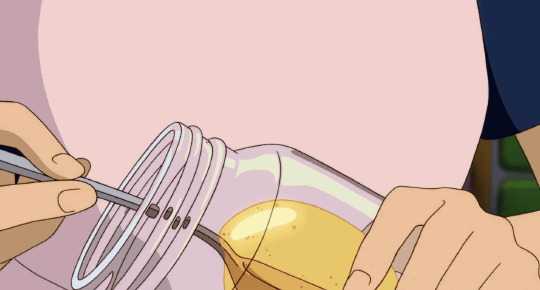
I try to always have fire cider on hand during the colder months. Fire cider is vinegar infused with warming, expectorant (mucus-clearing) herbs to help clear out gunk from our respiratory system. It's great for clearing up congestion and helping with wet coughs. Since pretty much everyone in my house tends towards wet cold symptoms (congestion/runny nose, coughing up mucus, etc.), we go through a lot of this stuff every cold and flu season.
I take a shot of fire cider as soon as I feel congestion or a wet cough coming on, or if I've been around someone I know is sick. While it doesn't always keep me from getting sick, I do think it helps speed up my recovery and keep my symptoms less severe.
A lot of fire cider recipes online and in herbalism books call for less common herbs that need to be purchased online or from a speciality herb shop. This year, I decided to make a batch with only herbs you can buy cheaply at most grocery stores. Here's the recipe for my fellow herbalists on a budget!
You will need:
A quart mason jar
1 whole head of fresh garlic, peeled and roughly chopped, OR 3 spoonfuls of pre-minced jarred garlic
3 knobs of fresh ginger about the size of your thumb, roughly chopped, OR 3 spoonfuls of store-bought ginger paste
1 package fresh thyme OR 2 tablespoons dried thyme
1 package fresh sage OR 2 tablespoons dried sage
1 quart apple cider vinegar
There are two methods I've used to make this cider. The traditional method is a slow infusion that takes 2+ weeks, but I've also developed a fast infusion method for when I feel a cold coming on and need a batch of fire cider ASAP.
Traditional Method:
Add your herbs to a clean mason jar. Pour the vinegar over the herbs and fill the jar to the top. Put a lid on the jar. (Vinegar will corrode metal lids, so either use a plastic lid or place a square of parchment paper between your jar and the metal lid.)
Place the jar in a cool, dark place and allow it to infuse for at least 2 weeks and up to 1 month. You can strain the herbs out to store at room temperature, or you can do what I do and store the whole thing in the fridge, herbs and all.
If you leave the herbs in, you can keep this batch of fire cider going all winter by topping the jar up with more vinegar every time it gets below halfway full.
Fast Infusion Method:
Add the herbs to the mason jar like you would for the traditional method. Instead of adding vinegar, fill the jar halfway with boiling water. Let sit for 2-3 hours.
Once the water has cooled down to room temperature, fill the jar the rest of the way with vinegar. Let it sit overnight and then either strain the herbs out or store the whole thing in the fridge.
To use the fire cider, take a shot glassful whenever you feel cold symptoms coming on. If you made your cider with the traditional method, you can dilute it with water if your stomach doesn't handle acid well. You can also mix in some honey to improve the taste.
Please note that fire cider and other folk remedies are not a replacement for medical care. I highly recommend staying up to date on your flu and COVID-19 vaccines in addition to using remedies like this.
#fire cider#herbal remedy#herbalism#traditional western herbalism#kitchen witch#kitchen witchery#kitchen witchcraft#green witch#green witchcraft#green witchery#budget herbalism#budget witchcraft#witchblr#mine#recipes
460 notes
·
View notes
Text
[Hanfu · 漢服]Chinese Western Han (202 BC – 9 AD) Traditional Clothing Hanfu Photoshoot
“这个位子 我有何坐不得?”
“我欲问鼎天下,试问谁与争锋”
"Why can't I sit in this seat?"
"I want to conquer the world, who can compete with me?"
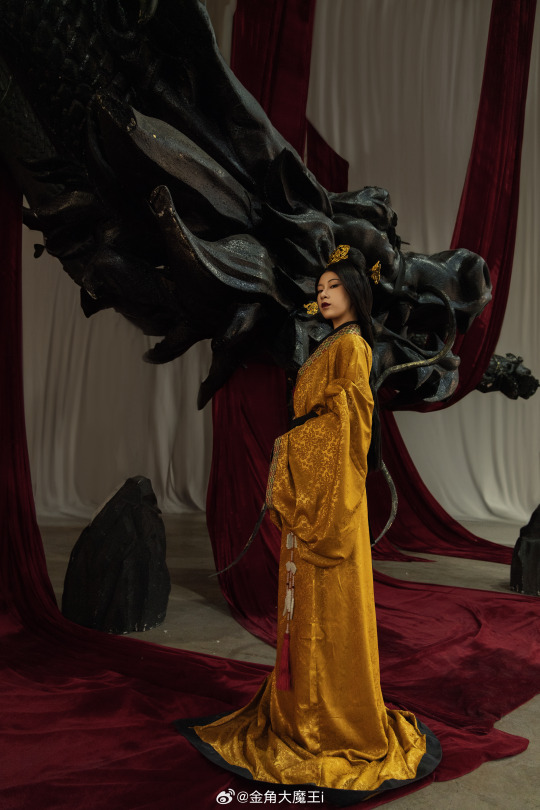
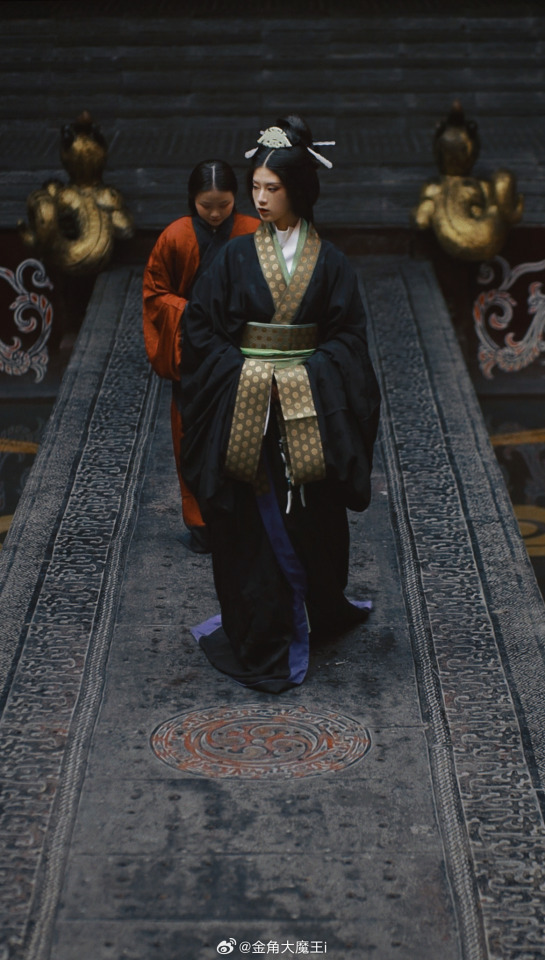
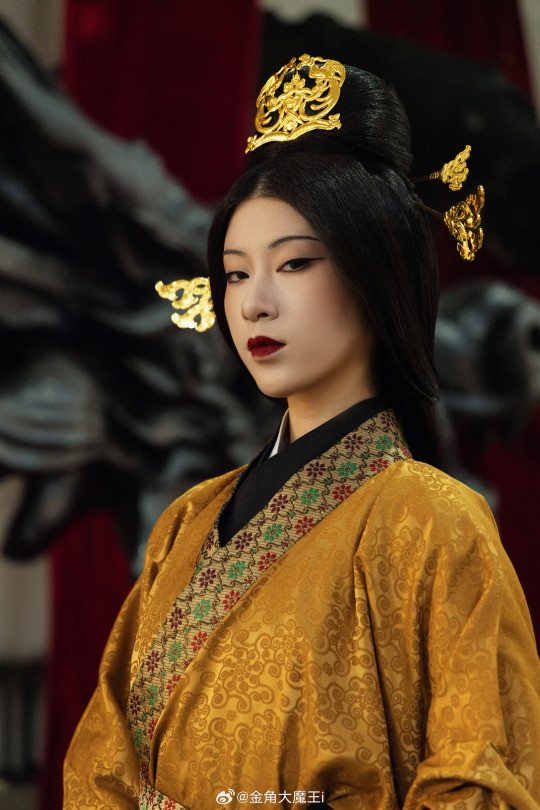
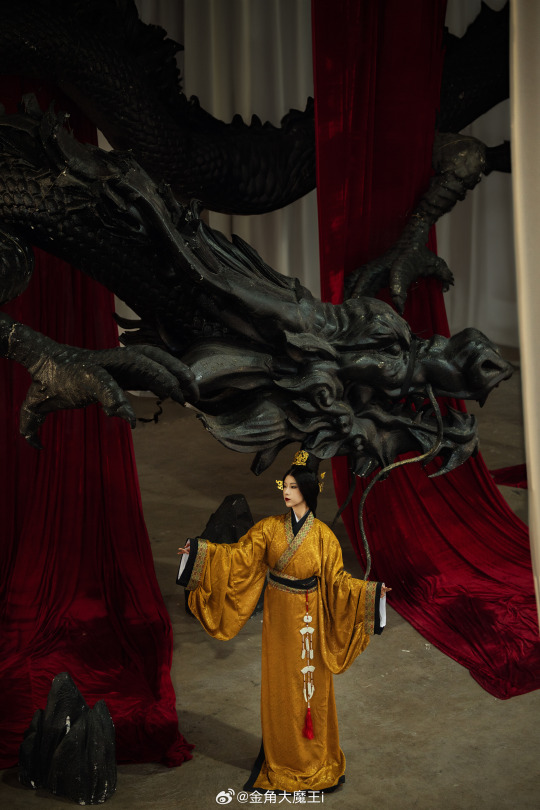

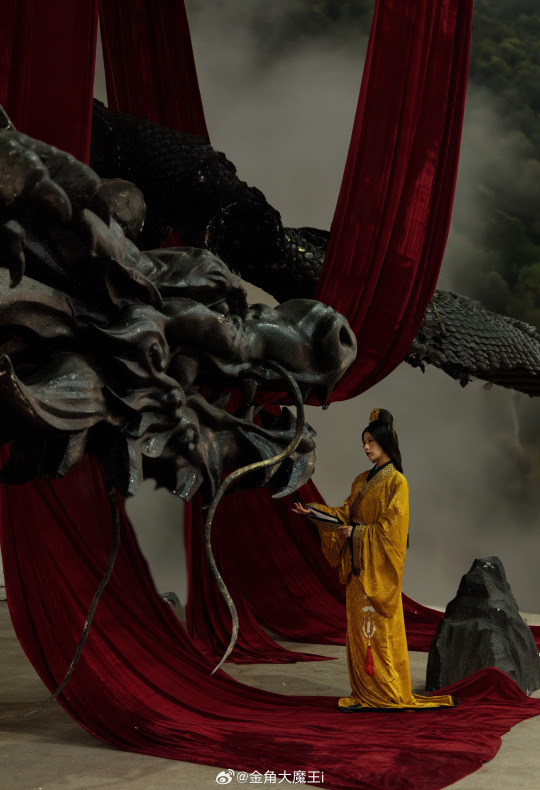


【About The First Empress of the Han Dynasty Empress Lü:Lǚ zhì(吕雉)】
Lü Zhi (241–18 August 180 BC), courtesy name E'xu (娥姁) and commonly known as Empress Lü (traditional Chinese: 呂后; simplified Chinese: 吕后; pinyin: Lǚ Hòu) and formally Empress Gao of Han (漢高后; 汉高后; Hàn Gāo Hòu), was the empress consort of Gaozu, the founding emperor of the Han dynasty. They had two known children, Liu Ying (later Emperor Hui of Han) and Princess Yuan of Lu. Lü was the first woman to assume the title Empress of China and paramount power. After Gaozu's death, she was honoured as empress dowager and regent during the short reigns of Emperor Hui and his successors Emperor Qianshao of Han and Liu Hong (Emperor Houshao).
She played a role in the rise and foundation of her husband, Emperor Gaozu, and his dynasty, and in some of the laws and customs laid down by him. Empress Lü, even in the absence of her husband from the capital, killed two prominent generals who played an important role in Gaozu's rise to power, namely Han Xin and Peng Yue, as a lesson for the aristocracy and other generals. In June 195 BC, with the death of Gaozu, Empress Lü became, as the widow of the late emperor and mother of the new emperor, Empress Dowager (皇太后, Huángtàihòu), and assumed a leadership role in her son's administration. Less than a year after Emperor Hui's accession to the throne, in 194 BC, Lü had one of the late Emperor Gaozu's consorts whom she deeply hated, Concubine Qi, put to death in a cruel manner. She also had Concubine Qi's son Liu Ruyi poisoned to death. Emperor Hui was shocked by his mother's cruelty and fell sick for a year, and thereafter no longer became involved in state affairs, and gave more power to his mother. As a result, Empress dowager Lü held the court, listened to the government, spoke on behalf of the emperor, and did everything (臨朝聽政制, "linchao ting zhengzhi"). With the untimely death of her 22-year-old son, Emperor Hui, Empress dowager Lü subsequently proclaimed his two young sons emperor (known historically as Emperor Qianshao and Emperor Houshao respectively). She gained more power than ever before, and these two young emperors had no legitimacy as emperors in history; the history of this 8-year period is considered and recognized as the reign of Empress Dowager Lü. She dominated the political scene for 15 years until her death in August 180 BC, and is often depicted as the first woman to have ruled China. While four women are noted as having been politically active before her—Fu Hao, Yi Jiang, Lady Nanzi, and Queen Dowager Xuan—Lü was the perhaps first woman to have ruled over united China.
Lü Zhi was born in Shanfu County (單父; present-day Shan County, Shandong) during the late Qin Dynasty. Her courtesy name was Exu (Chinese: 娥姁; pinyin: Éxǔ). To flee from enemies, her father Lü Wen (呂文) brought their family to Pei County, settled there, and became a close friend of the county magistrate. Many influential men in town came to visit Lü Wen. Xiao He, then an assistant of the magistrate, was in charge of the seating arrangement and collection of gifts from guests at a banquet in Lü Wen's house, and he announced, "Those who do not offer more than 1,000 coins in gifts shall be seated outside the hall." Liu Bang (later Emperor Gaozu of Han), then a minor patrol officer (亭長), went there bringing a single cent and said, "I offer 10,000 coins." Lü Wen saw Liu Bang and was so impressed with him on first sight, that he immediately stood up and welcomed Liu into the hall to sit beside him. Xiao He told Lü Wen that Liu Bang was not serious, but Liu ignored him and chatted with Lü. Lü Wen said, "I used to predict fortunes for many people but I've never seen someone so exceptional like you before." Lü Wen then offered his daughter Lü Zhi's hand in marriage to Liu Bang and they were wed. Lü Zhi bore Liu Bang a daughter (later Princess Yuan of Lu) and a son, Liu Ying (later Emperor Hui of Han).
Liu Bang later participated in the rebellion against the Qin Dynasty under the insurgent Chu kingdom, nominally-ruled by King Huai II. Lü Zhi and her two children remained with her father and family for most of the time during this period.
Even after Emperor Gaozu (Liu Bang)'s victory over Xiang Yu, there were still unstable areas in the empire, requiring the new government to launch military campaigns to pacify these regions thereafter. Gaozu placed Empress Lü Zhi and the crown prince Liu Ying (Lü Zhi's son) in charge of the capital Chang'an and making key decisions in court, assisted by the chancellor Xiao He and other ministers. During this time, Lü Zhi proved herself to be a competent administrator in domestic affairs, and she quickly established strong working relationships with many of Gaozu's officials, who admired her for her capability and feared her for her ruthlessness. After the war ended and Emperor Gaozu returned, she remained in power and she was always influential in many of the country's affairs.
In his late years, Emperor Gaozu started favouring one of his younger consorts, Concubine Qi(戚夫人), who bore him a son, Liu Ruyi, who was instated as Prince of Zhao in 198 BC, displacing Lü Zhi's son-in-law Zhang Ao (Princess Yuan of Lu's husband). Gaozu had the intention of replacing Liu Ying with Liu Ruyi as crown prince, reasoning that the former was too "soft-hearted and weak" and that the latter resembled him more. Since Lü Zhi had strong rapport with many ministers, they generally opposed Gaozu's decision but the emperor seemed bent on deposing Liu Ying. Lü Zhi became worried and she approached Zhang Liang for help, and the latter analysed that Gaozu was changing the succession on grounds of favouritism. Zhang Liang invited the "Four Whiteheads of Mount Shang", a group of four reclusive wise men, to persuade Gaozu to change his decision. The four men promised to assist Liu Ying in future if he became emperor, and Gaozu was pleased to see that Liu Ying had their support. Gaozu told Concubine Qi, "I wanted to replace (the crown prince). Now I see that he has the support of those four men; he is fully fledged and difficult to unseat. Empress Lü is really in charge!" This marked the end of the dispute over the succession and affirmed Liu Ying's role as crown prince.
In June 195 BC, Emperor Gaozu died and was succeeded by Liu Ying, who became historically known as Emperor Hui of Han. Lü Zhi was honoured by Emperor Hui as empress dowager. She exerted more influence during the reign of her son than she had when she was empress, and she became the powerful and effective lead figure in his administration.
Lü Zhi did not harm most of Gaozu's other consorts and treated them according to the rules and customs of the imperial family. For example, consorts who bore male children that were instated as princes were granted the title of "Princess Dowager" (王太妃) in their respective sons' principalities. One exception was Concubine Qi, whom Lü Zhi greatly resented because of the dispute over the succession between Liu Ruyi (Qi's son) and Liu Ying. Liu Ruyi, the Prince of Zhao, was away in his principality, so Lü Zhi targeted Concubine Qi. She had Qi stripped of her position, treated like a convict (head shaved, in stocks, dressed in prison garb), and forced to do hard labour in the form of milling rice.
Roles in the deaths of Concubine Qi and Liu Ruyi
Lü Zhi then summoned Liu Ruyi, who was around the age of 12 then, to Chang'an, intending to kill him together with his mother. However Zhou Chang (周昌), the chancellor in Liu Ruyi's principality, whom Lü Zhi respected because of his stern opposition to Emperor Gaozu's proposal to make Liu Ruyi crown prince, temporarily protected Liu Ruyi from harm by responding to Lü Zhi's order that, "The Prince of Zhao is ill and unfit for travelling over long distances." Lü Zhi then ordered Zhou Chang to come to the capital, had him detained, and then summoned Liu Ruyi again. Emperor Hui tried to save Liu Ruyi by intercepting his half-brother before the latter entered Chang'an, and kept Liu Ruyi by his side most of the time. Lü Zhi refrained from carrying out her plans for several months because she feared that she might harm Emperor Hui as well.
One morning in the winter of 195-194 BC, Emperor Hui went for a hunting trip and did not bring Liu Ruyi with him because the latter refused to get out of bed. Lü Zhi's chance arrived, so she sent an assassin to force poisoned wine down Liu Ruyi's throat. The young prince was dead by the time Emperor Hui returned. Lü Zhi then had Concubine Qi killed in an inhumane manner: she had Qi's limbs chopped off, eyes gouged out, ears sliced off, nose sliced off, tongue cut out, forced her to drink a potion that made her mute, and had her thrown into a latrine. She called Qi a "human swine" (人彘). Several days later, Emperor Hui was taken to view the "human swine" and was shocked to learn that it was Concubine Qi. He cried loudly and became ill for a long time. He requested to see his mother and said, "This is something done not by a human. As the empress dowager's son, I'll never be able to rule the empire" From then on, Emperor Hui indulged himself in carnal pleasures and ignored state affairs, leaving all of them to his mother, and this caused power to fall completely into her hands.
When Lu first came to the court, she planned to establish the Lu family members as "kings (nobles)". This was not only to commemorate her deceased relatives, but also to strengthen her power in the court. However, Wang Ling, the prime minister at the time, immediately pointed out that the great ancestor Liu Bang(Husband of Lu, founding emperor of Han Dynasty)once killed the white horse and agreed that "if someone who are not Liu family be come the king, the whole world should attack them." Therefore, the move of establishing a foreign surname as the king violated the ancestral system established by Liu Bang and was really inappropriate.
Faced with the obstruction of Wang Ling, Empress Lu responded by deposing him and insisting on honoring her deceased father and two brothers as King Lu Xuan, King Wu Wu, and King Zhao Zhao. After setting this precedent, Lu was out of control. She not only named her three nephews Lu Tai, Lu Chan, and Lu Lu as King Lu, King Liang, and King Zhao respectively, but also named her grandnephew Lu Tong. He was the King of Yan, and his grandson Zhang Yan was granted the title of King of Lu.
In addition, there are also quite a few people with the surname Lu who have been granted the title of marquis. As a result, it can be said that many princes surnamed Lu appeared in the court in the blink of an eye. They controlled the government and became the cornerstone and support for Empress Lu to control the right to speak in the court.
Empress Lu's life was emblematic of the intricate power dynamics of the Han Dynasty in ancient China. Born into a modest family, Lu rose to prominence through her marriage to Emperor Gaozu. Her astute political acumen and strategic alliances allowed her to wield significant influence behind the throne. As the mother of several emperors, she orchestrated their ascensions and manipulated court politics to consolidate power for her family. However, her ruthless pursuit of control and elimination of rivals earned her both admirers and enemies. In the end, her ambitions led to her downfall, as her unchecked power and manipulation of succession angered the nobility.As a result, after her death, the Lu family was retaliated and killed by the nobles and courtiers who supported the Han Dynasty, and the family was almost exterminated.Empress Lu's life illustrates the delicate balance of power, ambition, and intrigue in ancient Chinese imperial courts.
Literati in every dynasty in China often likened women who attempted to participate in government affairs and influence national policies to Empress Lü, saying they were vicious. One of them was Wu Zetian, the first official female emperor of China. However, compared with Empress Lü, Wu Zetian was more talented. Unlike Empress Lü, who was simply vicious, she ignored the system and stability of the empire and put personal and family interests first.
________________
📸Photo & Model :@金角大魔王i
🔗Weibo:https://weibo.com/1763668330/NFVOXthxX
________________
#chinese hanfu#Western Han (202 BC – 9 AD)#hanfu#Empress Lü#Lǚ zhì(吕雉)#china history#chinese history#hanfu accessories#hanfu_challenge#chinese traditional clothing#china#chinese#woman in history#漢服#汉服#中華風#金角大魔王i#historical fashion
192 notes
·
View notes
Text
“glorification of an imagined unified Western Traditional Culture as the single objective best culture is a fascist red flag” and “a lot of modern vernacular architecture is boring, actively harmful to the mental health of people who live around it, destroying older buildings that had more personality, and shoddily built + as bland as possible for the ever profit-focused needs of capitalism” are concepts that can coexist
like. yes, be wary of Roman Statue Profile Pics decrying “modernity” on Twitter, but the idea that IKEAfying the world is somehow Progressive and if you don’t like it you MUST be far-right is just. bizarre
#architecture#history#also these styles destroy non-western traditional architecture too. you know that right?#a blocky glass tower doesn't look like a Japanese house or pueblo or a crenellated Ethiopian palace#if someone were to build a Mughal architecture-inspired apartment building here in Boston I'd be like 'AMAZING'#ANY architecture with personality is the opposite of Capitalist Hellscape Chic#I just often use Victorian and Georgian buildings as examples because. that's what's around me and what my background is in
1K notes
·
View notes
Text
My job is never done here 🤠
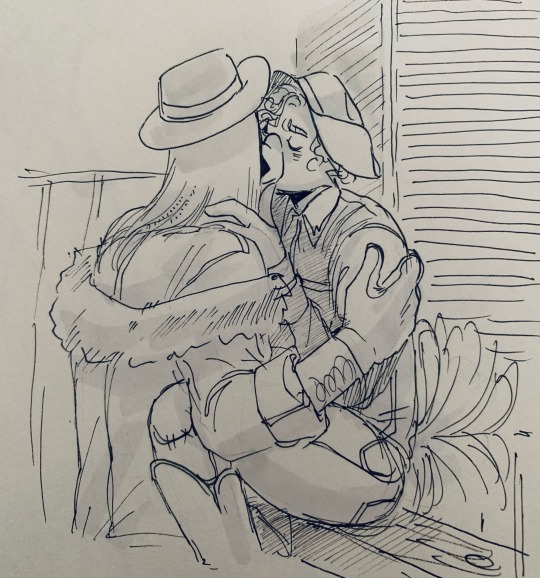

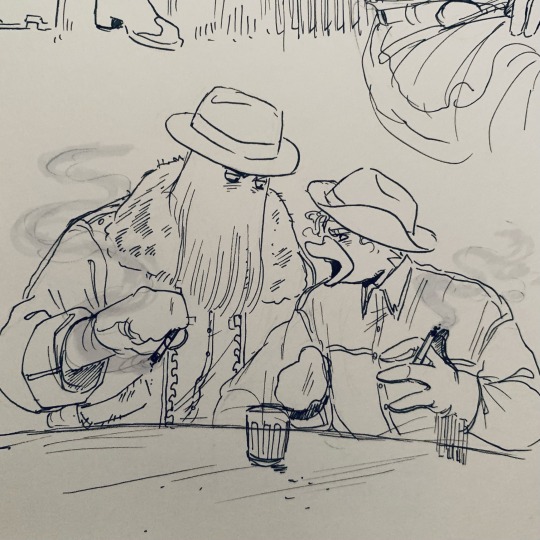


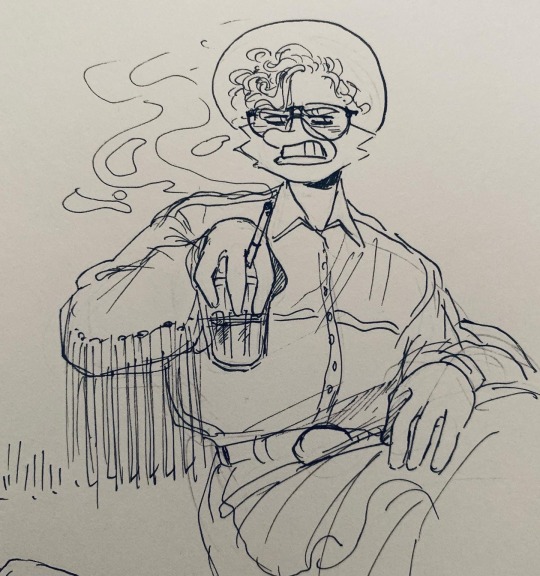

#illustration#dhmis#dhmis fanart#dhmis fandom#dhmis harry#dhmis red guy#fanart#dhmis duck#don’t hug me i’m scared#doodle#fluffybird#illustrator#sketch#traditional art#traditional sketch#fluffybird dhmis#sketching#dhmis yellow guy#cute art#western art#western#gay cowboy#cowboys#cowboy
1K notes
·
View notes
Text
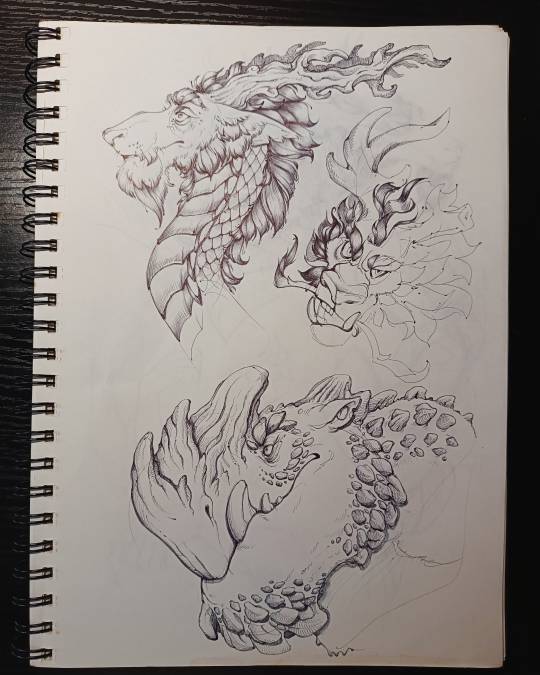



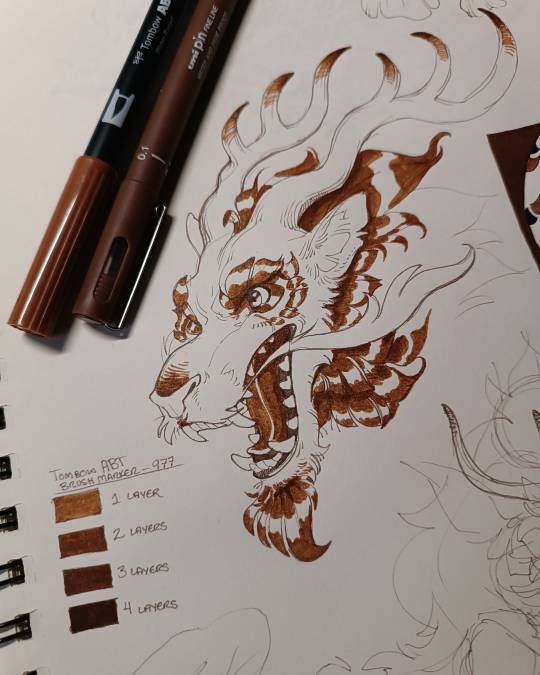
2024 / 4 / 19
A few snapshots of dragon sketches in ballpoint and fineliner pens. I often drag my feet on designing my actual dragon characters and opt for doing headshots of random dragons instead. But this keeps me actively drawing, at the very least.
I do love the nose horns on the big fella though, so I'm gonna be exploring that design element further in a character of mine.
#art of empyrisan#sketchblog#sketchbook#dragons#eastern dragon#western dragon#chinese dragon#asian dragon#traditional art
76 notes
·
View notes
Text
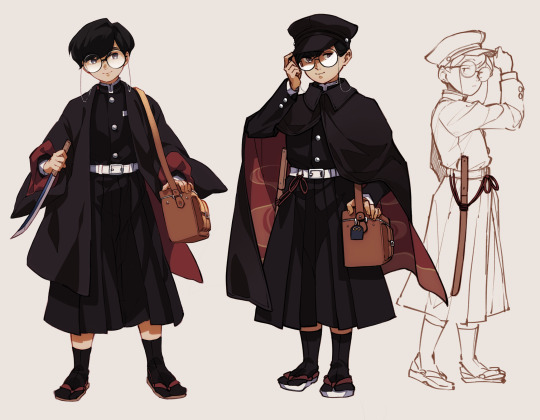
An alt design (redesign?) for my demon slayer oc, koharu
Wanted to incorporate the little clouds inside the cape for more coherence with the other two Ebisu siblings, and figured that since they’re the main “researcher” of the family, and the one with the least physical strength to offer, their design should lean slightly more into academia with the cape and the hat! Was thinking of making it a tonbi (overcoat with shoulder-cape down to sleeve length and inner jacket) but I think the single long cape makes the design overall easier to read :)
#kimetsu no yaiba#kny oc#demon slayer oc#I am. in love with the outfits of the meiji to showa eras#i honestly can’t say much because I’m not Japanese and all I know is from rudimentary amounts of research on the internet but#I really enjoy the way capes and hats from western designs combined with more traditional looking clothes like kimono looks#I think koharu would wear the cap and cape in cities and surrounding areas where it’s more common to see a student around#whereas the haori is saved for mostly rural missions where looking like a student is impractical#the cape has the added benefit of making it very easy to hide their sword in broad daylight#they don’t put it through the belt because the way that the sword tilts forward is pretty obvious and could get them arrested#so the string on the belt loops lets it dangle more vertically to follow the legs more and be inconspicuous
315 notes
·
View notes
Text

Desert at Dusk (1928) by Audley Dean Nicols
#art#traditional art#painting#oil painting#oil on canvas#1920s art#1920s#1928#history#art history#Audley Dean Nicols#20th century#20th century art#american art#american history#landscape#wild west#western art#desert#cowboy aesthetic#cowboy
245 notes
·
View notes
Text
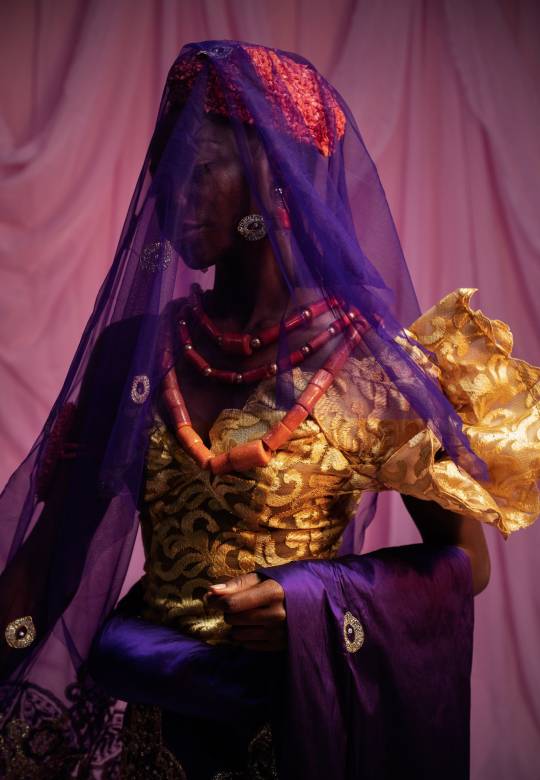
Igbo bride, Nigeria, by Lakin Ogunbanwo
#igbo#nigeria#africa#western africa#folk clothing#traditional clothing#traditional fashion#cultural clothing
945 notes
·
View notes
Text

243 notes
·
View notes
Text

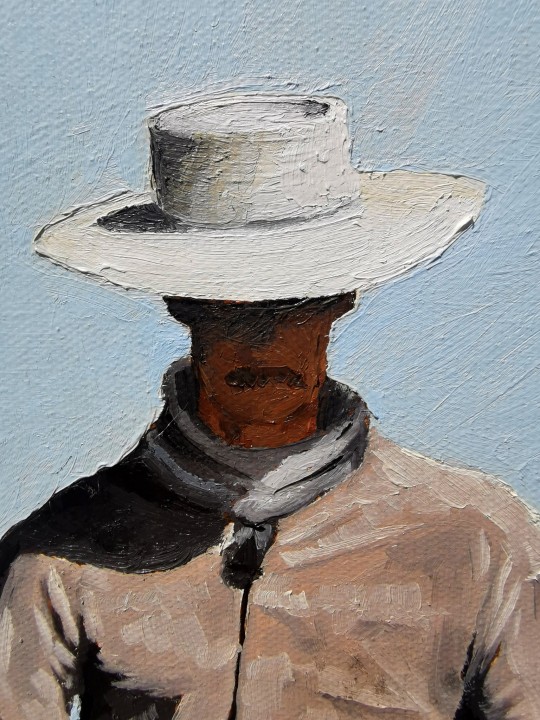


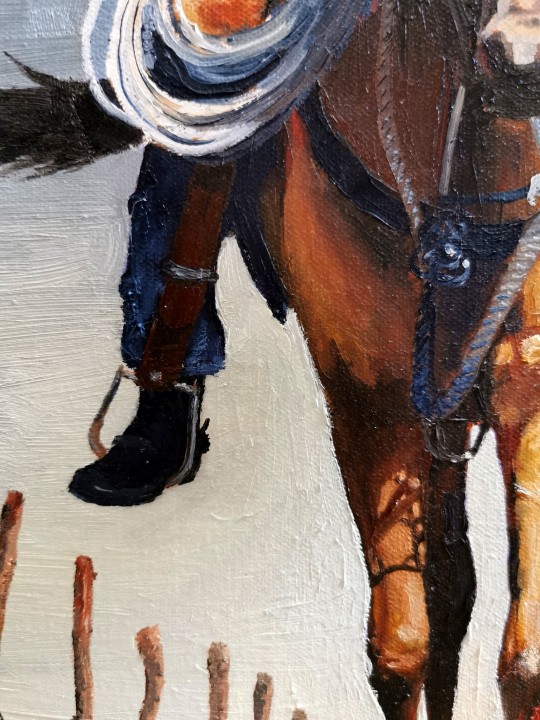
"Saddle Weary." 45x60cm, oil on canvas.
FINALLY done this one. The amount of times I painted over something only to rub it away, and then repaint it, over and over and over again, was insane. But it was worth it because this looks sick af now
280 notes
·
View notes